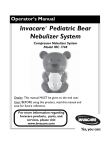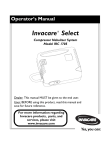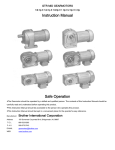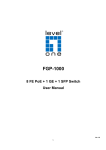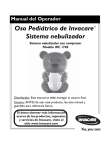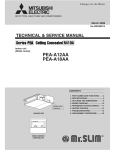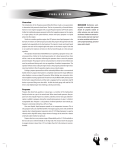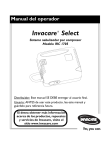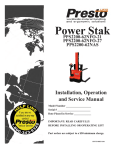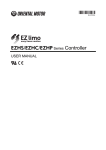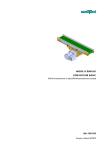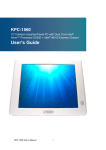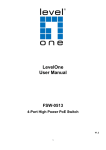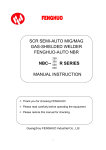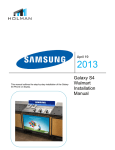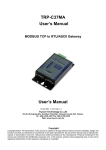Download GTR Mini Gearmotors - Brother International Corporation
Transcript
GTR mini Gearmotors 1/50 Hp ■ 1/30 Hp ■ 1/20 Hp ■ 1/15 Hp ■ 1/10 Hp ■ 1/6 Hp Instruction Manual G-Type H-Type F2 Series G-Type・Water-resistant F2 Series・Water-resistant H-Type・Water-resistant For Safe Operation ●The Gearmotor should be operated by a skilled and qualified person. The contents of this Instruction Manual should be carefully read and understood before operating this product. ●This Instruction Manual should be accessible to the person who operates this product. ●This Instruction Manual should be kept in a convenient place for the operator's easy reference. Address TEL FAX E-MAIL WEB Brother International Corporation 100 Somerset Corporate Blvd, Bridgewater, NJ 08807 866-523-6283 908-575-3743 [email protected] www.brother.com Thank you for purchasing our product. Potential injuries and/or damage caused by mishandling equipment are classified into two categories, "Danger" and "Caution". The definitions of the classifications are given below with the corresponding graphic symbols. Danger Caution Mishandling the equipment may result in a dangerous situation and may lead to serious or fatal injury to personnel. Mishandling the equipment may result in a dangerous situation and may lead to medium to light injury or damage to the equipment. Please be aware that even items marked with "CAUTION" may cause fatal accidents. Therefore, it is important to follow the instruction for every item described. Danger ●Use an explosion-proof motor when any explosive or flammable gases are present. Failure to observe this warning may cause explosion, spark, fire, electric shock, physical injury, and/or damage to the equipment. ●People in charge of transportation, installation, wiring, operation, maintenance, and inspection of the equipment should have sufficient knowledge and technical skill to install electrical and mechanical products. Failure to observe this warning may cause explosion, spark, fire, electric shock, physical injury, and/or damage to the equipment. ●Do not repair or wire the equipment with the electric power on. Cut the power before working on this product. Failure to observe this warning may cause electric shock. ●If the equipment incorporating this gearmotor is used in a system for human transport, furnish it with sufficient protective devices for safety and follow any and all local or national codes. Failure to observe this warning may cause physical injury, death and/or damage to the equipment. ●If the equipment is to be used to drive an elevator, be sure to furnish it with safety devices to prevent the elevator from accidentally falling. Failure to observe this warning may cause physical injury and/or damage to the equipment. ●Be sure not to get water or oil/grease into the brake unit. Failure to observe this warning may cause brake failure by decreasing brake holding torque. 2 Caution ●Do not use this gearmotor under conditions other than specified on the nameplate or product specifications. Failure to observe this warning may cause electric shock, physical injury and/or damage to the equipment. ●Do not insert your fingers or any other object into the terminal box, lead wire exit, fan cover, or any other aperture of the gearmotor. Failure to observe this warning may result in electric shock, physical injury, fire and/or damage to the equipment. ●Do not use a damaged gearmotor. Failure to observe this warning may result in physical injury and/or fire. ●Do not remove the nameplate. ●The manufacturer will not warrant and will not be responsible for any product modified or repaired by the user. 1 2 3 4 5 6 7 Contents Check at Unpacking ............ P.3 Transportation .................... P.4 Storage ............................... P.4 Installation ......................... P.5 Connecting With Other Equipment ..... P.6 Direction of Rotation .......... P.8 Wiring ................................. P.9 8 9 10 11 12 13 Operation .......................... P.18 Inspection/Adjustment ..... P.20 Troubleshooting ............... P.24 Disposal ............................ P.25 UL/CSA Information .......... P.26 Standard Terms and Conditions of Sale .. P.27 1 Check at Unpacking When unpacking the carton, please check the following items. If you have any problems or questions, please contact the dealer from which the product was purchased or Brother International Corp sales office. Caution Check whether the product is the product you ordered. Installing the wrong gearmotor on your equipment may cause physical injury and/or damage to the equipment. (1) The ordered products and the contents indicated on the nameplate are correct. (Type, Reduction Ratio, RPM, Horsepower or Watts, Voltage, Frequency, etc.) (2) No accidental damage to the product during transportation has occurred. (3) Screws or nuts are not loose. (4) In case of a brake equipped gearmotor, be sure the rectifier is enclosed. (5) In case of a single-phase motor be sure the capacitor is enclosed. (6) In case of F2 series hollow bore/shaft mount type be sure the bore safety cap is enclosed. 3 2 Transportation Danger ●When a product is lifted up for transportation or installation use care. Products are heavy and may be damaged and/or cause serious injury if they are dropped. Caution ●Be careful when transporting products. Avoid dropping them. ●Before lifting a gearmotor, be sure to confirm the weight using the packing box or the product catalog. ●Do not lift a gearmotor that is heavier than the specifications the mechanical lift allows. Failure to observe this warning may cause physical injury and/or damage to the equipment. 3 Storage ●Strage Location (1)If the gearmotor or reducer will be stored for more than 6 months, store it indoors in a well ventilated, dry area that is free from direct sunlight, excessive temperature change, excessive humidity, dust, or corrosive gas. (2)Do not store the gearmotor or reducer directly on the ground. (3)Bearings may be damaged by fretting corrosion caused by vibration during storage. Store the products in a location free from vibration. ●Strage Procedures (1)To avoid oxidation on the bearings, run the gearmotor or reducer every 6 months and check for smooth rotation and abnormal noise. (2)Measure the insulation resistance of the motor using a 500V megger. The resistance should exceed 1MOhm. (3)Apply anti-corrosive treatment every 6 months to any machined or unpainted surfaces such as the output shaft, pilot, or mounting flange. ●Operation After Extended Storage (1)Prior to operation after extended storage check the motor insulation resistance using a 500V megger. It should exceed 1 MOhm. (2)Check for any abnormal noise, vibration, or temperature rise upon initial starting of the motor. (3)If the gearmotor has a brake, be sure the brake functions properly prior to applying an external load to the gearmotor. 4 4 Installation Proper installation of a product will ensure reliable service and maximum life. Caution ●Do not place any flammable object near the gearmotor. Failure to observe this warning may cause fire. ●Do not allow interference with the ventilation of the gearmotor. Be sure to observe the spacing requirements for adequate air flow around the gearmotor. In the case of a fan cooled model, do not block the vent holes on the fan cover. Failure to observe this warning may result in abnormal overheating and/or injury or fire. ●Do not step on a gearmotor. Do not use a gearmotor as a grip to hoist yourself onto a machine. Failure to observe this warning may cause physical injury. ●Do not touch the edge of the shaft of the gearmotor or the key groove in the bore with your bare hands. Failure to observe this warning may cause physical injury. ●Food machine regulations may prohibit the possibility of oil or grease getting into the food area. If this is the case, please use a drip pan to prevent lubrication from getting into the food area. Alternatively, please request that appropriate food grade lubricants are applied. ●Leaking oil may cause products to fail. ●There is possibility scatter the wear debris or iron powders. In case of installing to equipment which will have any issue due to contamination of foreign substance such as food equipment, please install preventive equipment. This could harm the products. ●Vibration resulting from improper installation of the gearmotor or from other sources should be under 0.5G. ●In the hot and humid environment, when ambient temperature changes suddenly, internal condensation may occur in the terminal box. Especially, in the ocean transport of the machine by vessel, condensation may occur, therefore, pay careful attention to the transport atmosphere. Internal condensation is a phenomenon that in the hot and humid environment, if temperature suddenly drops from high to low, or if a reducer is suddenly moved from low-temperature place to hot and humid place, steam condensation occurs and the droplet land on the terminal. ●In the low temperature of below 0℃, pay careful attention to the freezing. The droplets land on the terminal by condensation or by abnormally high humidity atmospheres, and when temperature drops below freezing point, the droplets become ice. This is what we call “Freezing”. You must note that there is a danger of electrification caused by the short circuit between terminals by freezing. (1)Proper location for installation Ambient Temperature: −10℃ to 40℃ (14°to 104°F) Ambient Humidity: 85% max. Altitude: Sea level to 3280 feet (1,000 meter) max. Environment: [Standard Type]: Well ventilated free from corrosive gas, explosive gas, vapor and/or dust. [IP-65 Type]: Well ventilated, free from corrosive gas, explosive gas, or vapor. Operation submersed in water or subjected to high-hydrostatic pressure jets of water is not permitted. Installation Location: Indoors 5 (2)Direction of Installation This product can be installed in any direction and any angle due to a grease lubrication system. (3)Method for Installation ①Attaching the mounting foot or flange Secure the product with four bolts on a flat and machined surface free from vibration. (Roughness of the surface should be less than 0.3mm.) ②Attaching the hollow bore/shaft mount unit to a shaft. ●The shaft should be able to support the gearmotor’ s weight. (Forces other than turning or reactive force should not be imposed on the torque arm.) ●In case of frequent start/stop or frequent forward/reverse applications tighten the torque arm with bolts to keep the locking hole secure. Tightenting Torque for Torque Arm Fixing Hole Metric (mm) Metric Bolt Size Tightening Torque (N-m) Fixing Hole Inch (in) Inch Bolt Size Tightening Torque (in-lb) 6.5 8.5 11 13 15 18 M6 M8 M10 M12 M14 M16 4.9 13 25 44 69 108 0.25 0.33 0.43 0.51 0.59 0.71 1/4-20 5/16-18 3/8-16 7/16-14 7/16-14 5/8-11 43 115 220 390 390 955 5 Connecting With Other Equipment Caution ●When connecting the gearmotor to the load with a chain or belt, make sure of the shafts parallel alignment is precise. Make sure the belt/chain tension is properly adjusted and pulleys or sprockets are parallel. ●When direct coupling, make sure the concentric alignment of shafts is precise. ●Before operation, make sure the set screws for the sprockets, pulleys or coupling are securely tightened. Failure to observe this warning may cause serious injury and/or damage to the equipment. ●Safety guards should be furnished around rotating parts and securely in place before starting the equipment. ●Do not over tension chain or belts. Damage to the gearmotor may occur due to excessive overhung load. ●Avoid excessively rigid direct couplings as damage may occur to the bearings due to high overhung load. 6 1 Direct Connection The center of the shaft of both machines should be aligned concentrically precise. The displacements δ and θ should be minimized as much as possible. Please refer to the manufacturer of the couplings allowance for misalignment. 2 Attaching Chains, V-Belts, Gears, etc. 3 F2 Series Hollow Bore/Shaft Mount : Attaching and Removing a Shaft (1) Make sure the shaft of the gearmotor and the driven shaft of the equipment are parallel. (2) Chains, V-Belts, couplings, or gears must be perpendicular to the center of the shaft. (3) Excessive tensioning of a V-belt or chain may result in damage to the bearings of the gearmotor or driven shaft. (4) If the chain or V-belt is installed loosely, shock load may occur when the driven shaft starts. This can result in damage to the reducer or the equipment. Adjust the tension of the chain properly. ①Attaching the Shaft ●Apply anti-seizing agent such as molybdenum disulfide on the driven shaft. ●If the fit is tight, tap the edge of the hollow drive shaft with wooden hammer. ●If strong impact or heavy radial loading is expected, the fit should be tighter. ●In general, a loose fit is recommended for the fit tolerance of the driven shaft. ②Removing the Shaft Note: To allow smooth removal, design the driven shaft to stop short of the snap ring groove. 7 ③Securing the Shaft If the driven shaft has a shoulder If the driven shaft does not have a shoulder Note: Firmly secure the driven shaft to the bore. ●Specifications for the fixing parts of driven shaft Bolt Size Dimension of Spacer Metric Inch O.D. I.D. Width Type of Snap Ring F2S-12 M5 1/4-20 0.48 0.24 0.12 Nominal 1/2 F2S-15 M6 1/4-20 0.61 0.28 0.12 Nominal 5/8 6 Direction of Rotation Caution Before coupling with the other machine check the direction of rotation. Unexpected operation in wrong direction may cause serious injury and/or damage to the equipment. The relationship of the rotational direction of the input shaft and the output shaft are as shown below: ●G-Type 1/50 Hp, 1/30 Hp, 1/20 hp, 1/15 Hp, 1/10 Hp 5:1 to 60:1 same direction 80:1 to 1800:1 counter direction 8 1/6 Hp 5:1 to 30:1 same direction 40:1 to 60:1 counter direction ●H-Type 1/50 Hp・1/30 Hp: 1/20 Hp・1/15 Hp: 1/10 Hp: 10:1 to 60:1, 300:1 to 1800:1 10:1 to 60:1, 300:1 to 900:1 10:1 to 60:1, 300:1 to 450:1 1/50 Hp・1/30 Hp: 1/20 Hp・1/15 Hp: 1/10 Hp: 80:1 to 240:1 80:1 to 240:1, 1200:1 to 1800:1 80:1 to 240:1, 600:1 to 1800:1 ●F2 Series 10:1 to 60:1 80:1 to 240:1 7 Wiring Danger ●When connecting power to the machine, follow the instructions shown on the connection diagram in the terminal box or in this Instruction Manual. Failure to observe this warning may cause electric shock or fire. ●Do not bend, pull, or tuck motor cables or lead wires forcibly. Failure to observe this warning may cause electric shock. ●Be sure to ground the earth terminal, lead wire, or lug. Failure to observe this warning may cause electric shock. ●Be sure to use the power source specified on the name plate. Failure to observe this warning may cause the motor to burnout and/or fire. ●Do not damage the insulation jacket of the lead wire when peeling off the outer sheath of a cable. Failure to observe this warning may cause electric shock or fire. ●Avoid exposing the power rectifier or capacitor to water. Failure to observe this warning may cause electric shock, damage to the equipment, or fire. ●On IP-65 models do not open the cover of the water and dust-resistant box. Failure to observe this warning may cause electric shock, damage to the equipment, or fire. 9 Caution ●3-phase motors should be protected by a thermal relay. If “CE” is required, a thermal relay certified for use in Europe should be used. ●The thermal set value should be the same as the current value specified in the name plate. ●Single-phase motors have a thermal protector built in. If you suspect the thermal protector has tripped, switch off the power to the gearmotor and/or the machine before attempting any inspection. ●Single phase motors trip temperature is 120℃±5℃, Reset temperature: under 105℃. The gearmotor will be hot if the thermal has tripped. Do not touch it with your bare hand as this will cause a burn injury. ●Do not touch the terminals or un-insulated wire connections when inspecting the insulation resistance. Failure to observe this warning may cause electric shock. ●Wires should be connected properly using the specified electrical standard or safety code. Failure to observe this warning may cause electric shock, fire or physical injury. ●Three phase motors are not equipped with thermal protective devices. Other protection devices such as circuit breaker or fuse are recommended. Failure to observe this warning may cause damage to the equipment, electric shock, fire or physical injury. ●When operating a gearmotor not connected to a load, remove the key from the output shaft. Failure to observe this warning may cause physical injury. ●Check the direction of rotation before connecting the gearmotor to the machine's load. Rotation in the wrong direction may cause physical injury and/or damage to the equipment. ●If a 460V class inverter is used to drive the motor, use a control filter or a reactor with the inverter. Breakdown of motor insulation due to repetitive and/or extreme voltage spikes caused by normal operation of the inverter may cause damage to the equipment or fire. ●Single phase motors use a continuous running type capacitor. Do not substitute a starting capacitor intended for intermittent duty use. A starting type capacitor will fail when used with a permanent split capacitor motor. Use of a starting capacitor may cause damage to the equipment or failure of the capacitor. For replacement capacitors, please consult Brother or your Brother Distributor. ●Do not damage the vinyl coating of the capacitor. Damage may cause electric shock. ●Voltage drop in the wiring should be kept above 2%. Excessive length of wiring may cause a severe voltage drop. Voltage drop reduces starting capacity and may result in the load not starting. ●When reversing a gearmotor be sure to fully stop rotation before starting in the reverse direction. Failure to completely stop the motor before reversing may cause physical injury and/or damage to the equipment. ●Reversing a PSC motor without completely stopping first may result in the motor not reversing and continuing to run in the same direction. This may cause physical injury and/or damage to the equipment. 10 Caution ●When using a gearmotor with a brake do not energize the brake coil continuously while the motor is not running. The brake coil of totally enclosed, fan cooled motors may rely on the motor fan for cooling. Continuous operation without the effect of the fan may cause the brake coil to burn out and/or fire. ●Totally enclosed, non-ventilated brake-equipped motors do not rely on the fan for cooling. However, continuously energizing the coil without motor operation may still cause damage. ●If a gearmotor with a brake is used as a lift or hoist; DC Switching wiring should be used. Failure to use DC Switching may result in the lift or hoist falling and causing damage to the equipment or physical injury. Special Notes About Wiring (1) The brake rectifier (A100-D90 or A200-D90) contains diodes. Improper wiring may cause a fatal short-circuit and damage or destroy the rectifier. Special care should be used when wiring. (2) The brake circuit relay for AC Switching should be an electro-magnetic switch with the capacity greater than 6A (AC200V). (3) The brake circuit relay for DC Switching should be an electro-magnetic switch with a capacity of (1A) DC110V. (4) If a noncontact relay is used an electromagnetic switch with a rated voltage of AC240V is recommended. (The capacity to switch half-wave rectification is required.) (5) The direction of rotation of the output shaft varies according to the reduction ratio of the gear head. Be sure to confirm the gear ratio and the direction of rotation before wiring and starting. (6) The voltage between the capacitor terminals of a single-phase motor will become nearly twice that of the power source of the motor. Therefore be sure to insulate wires at the terminals for safety. Special Notes About Grounding ①Ground should be connected to the provided ground terminal, lead wire, or lug. ②The cross-section of the earth wire should be AWG18 (0.87mm 2) minimum. ③The earth wire should be longer than the lead wire of the power source of the motor. Wiring a Gearmotor For standard gearmotors, the wiring described below is recommended. The direction of rotation referenced is as viewed from the back of the motor. Counter clockwise is the forward direction for 3-phase motors. Clockwise is the forward direction for single-phase motors. 11 Three Phase: Lead Wire Type, A Box Type, C Box Type 208/230V 460V Single Phase: Lead Wire Type, A Box Type, C Box Type 115V 220/230V MS:Electro-magnetic Switch C:Capacitor Wiring a Brake-equipped Gearmotor (1) If a gearmotor is used in an application requiring fast brake response, such as a lift or hoist, "DC Switching" should be used. (2) A surge suppressor is recommended if DC Switching is required. (See diagram for details Varistor voltage 423~517V) (3) The brake coil voltage for a three phase motor 208/230V or 460V, or a single phase motor 220/230V is DC104V to DC94V. (4) The brake coil voltage of a single phase 115V model is DC52V. (5) The required input voltage to the yellow and white wires of the rectifier (A200-D90 [A100-D45]) for single phase 115V motors is single phase 115VAC. The voltage output to the brake is DC52V. (6) The required input voltage to the yellow and white wires of the rectifier (A200-D90 [A100-D45]) for three phase motors 208/230V or 460V, or for single phase 220/230V motors is single phase 220/230VAC. The voltage output to the brake is DC104V to DC94V. (7) If AC switching is used, the electro-magnetic switch used in the brake circuit should have a capacity greater than 6A (AC200V). (8) If DC Switching is used, the electro-magnetic switch should have a capacity of 1A DC110V in order to shield the inductive load. (9) If a noncontact relay is used, an electro-magnetic switch with a rated voltage of AC240V is recommended (The capacity to switch half-wave rectification is required). (10)The rectifier unit contains diodes. Improper wiring may cause fatal short-circuiting and failure of the rectifier. Special care should be taken when wiring. (11)When operating the machine with inverter, refer to the "Cautions for operation with an inverter" on page 17. 12 Brake Lag Time (sec) DC Switching 0.005~0.015 AC Switching (A) 0.03~0.10 AC Switching (B) 0.1~0.2 ・This is the time consumed from the moment the brake is switched off to the moment braking starts. It is not the total braking time. ・The length of time varies from that of the water-resistant gearmotor. 3 Phase 208/230V 460V DC Switching AC Switching (A) AC Switching (B) -N-: Surge Suppressor 13 Single Phase 115V 220V, 230V DC Switching AC Switching (A) AC Switching (B) -N-: Surge Suppressor MS: Electro-magnetic Switch (not provided by Brother, please purchase separately) C: Capacitor (included with gearmotor as separate accessory part, unless otherwise specified) Wiring a Water Resistant IP-65 Gearmotor (1) Do not damage the lead wire insulation jacket when peeling off the sheath of the cable. (2) A GFCI should be used for safety whenever water is persistently present. (3) Do not open the cover of the water/dust-resistant box. Failure to observe this warning may damage the seal of the box. (4) The voltage between the capacitor terminals of a single-phase motor will be nearly twice that of the power source. Therefore be sure to insulate wires at the capacitor terminals. 14 Three Phase Single Phase 208/230V 115V or 220/230V Note: 460V not available for IP-65 Mini. Note: Blue wire is Brown for 220/230V (5) Be sure to protect the terminal of cab tyre cable from splashing water. Splashed water may penetrate through the sheath of cab tyre cable and reach to the inside of motor, which may cause trouble in motor. Sheath(cable jacket) lead wire Terminal of cab tyre cable Wiring a Gearmotor with a Water-resistant Brake (1) In an application requiring fast brake response, such as a lift or hoist, use "DC Switching". (2) A surge suppressor is recommended if DC Switching is required Varistor voltage 423~517V. (3) The brake coil voltage for a 3 phase motor 208/230V or 1 phase motor 220/230V is DC104V to DC94V. (4) The brake coil voltage of a single phase 115V model is DC52V. (5) The required input voltage to the yellow and white wires of the rectifier (A200-D90 [A100-D45]) for single phase 115V motors is single phase 115VAC. The voltage output to the brake is DC52V. (6) The required input voltage to the yellow and white wires of the rectifier (A200-D90 [A100-D45]) for three phase motors 208/230V or for single phase 220/230V motors is single phase 220/230VAC. The voltage output to the brake is DC104V to DC94V. (7) If AC switching is used, the electro-magnetic switch should have a capacity greater than 6A (AC200V). (8) If DC Switching is used, the electro-magnetic switch should have a capacity of 1A DC110V in order to shield the inductive load. (9) If a noncontact relay is used, an electro-magnetic switch with a rated voltage of AC240V is recommended (The capacity to switch half-wave rectification is required). (10)The rectifier unit contains diodes. Improper wiring may cause failure of the rectifier. Special care should be taken when wiring. 15 (11)When operating the machine with an inverter, please refer to the "Cautions for operation with inverter” on page 17. (12)The rectifier is not of waterproof construction. Brake Lag Time (sec) DC Switching 0.01~0.02 sec AC Switching (A) 0.05~0.15 sec AC Switching (B) 0.1~0.2 sec Three phase: 208/230V ・This is the time consumed from the moment the brake is switched off to the moment braking starts. It is not the total braking time. ・The length of time varies from that of the standard gearmotor. Single Phase: 115V or 220/230V DC Switching AC Switching (A) AC Switching (B) -N-: Surge Suppressor Note: For single phase 220/230V, the Blue wire is Brown. MS: Electro-magnetic Switch (not provided by Brother, please purchase separately) C: Capacitor (included with gearmotor as separate accessory part, unless otherwise specified) 16 Cautions for Operation with an Inverter (VFD) (1) Compared to operation using a general power source, higher temperature rise, noise and vibration may be observed when using an inverter. (2) Low speed (low frequency) operation naturally reduces the cooling effect of the fan. This may cause abnormal temperature rise. Please use caution and check to if the surface temperature remains below allowable levels (176°F, 80℃) (3) When driving a gearmotor equipped with a brake, the brake will malfunction due to voltage drop caused by normal operation of the inverter (VFD) if the rectifier is powered by the output side of the inverter(VFD). To avoid this, it is imperative to bypass the inverter when wiring the brake. When using a 460V inverter (VFD), it is recommended that a suitable filter or reactor be (4) used to suppress excessive repetitive voltage spikes caused by the normal operation of a 460V inverter (VFD). Failure to take this precaution may result in premature burn-out of the motor and breakdown of the motor insulation. Please consult the inverter manufacturer for the proper size of the filter or reactor as it depends on the inverter parameter settings, length of wire, etc. When using a 460V inverter with a brake, do not use the 200~220V terminal (red lead (5) wire) made available by tapping the motor windings. Due to voltage drop caused by normal operation of the inverter (VFD), power from the tapped wires (red lead wires) is not reliable and will result in brake failure. The rectifier (A200-D90) must be powered with a separate 200~230V 1 phase source. Alternatively, if the power source is 115V, please consult brother for the purchase of a rectifier that accepts 115VAC and has an output of 90VDC (Ref P/N: A100-D90 rectifier). ■ Wiring a Brake Equipped Gearmotor with an Inverter (VFD) 115V 1 Phase 220/230 1 Phase 208/230 3 Phase 460V DC Switching AC Switching (A) Note1: If the input power is 115V 1phase, use Rectifier A100-D90. If the input power is 220/230V 1 phase, use rectifier A200-D90. (Input power to the brake is 90vdc) MS: Magnetic Switch (not supplied by Brother) Z: Surge Suppressor. Optional Part OP-ERZV10D471 17 8 Operation Danger ●Do not operate the gearmotor with the terminal box cover opened. Failure to observe this warning may cause electric shock. ●Do not approach or touch rotating parts such as a shaft while the machine is running. Failure to observe this warning may cause physical injury. ●If power loss occurs; switch off the power supply to the machine. Unexpected recovery of electric service may cause a sudden start of the gearmotor and cause physical injury and/or damage to the equipment. Caution ●The gearmotor may become hot during operation. Do not touch it with your bare hands. Failure to observe this warning may cause burn injury. ●When a gearmotor is running abnormal, stop it immediately. Failure to observe this warning may cause electric shock, physical injury or fire. ●Do not overload a gearmotor. Failure to observe this warning may cause physical injury and/or damage to the equipment. ●Do not touch any current-carrying part of the capacitor used for a single-phase motor until it has been discharged completely. Failure to observe this warning may cause electric shock. ●When reversing the direction of a single-phase motor, it must come to a complete rest before starting rotation in the opposite direction. If a single phase PSC motor does not come to a complete stop before reversing, the direction of rotation may not change. Failure to stop the motor completely before reversing may cause physical injury or damage to the machine. ●Do not stop or stall a motor forcibly. It may cause damage to the machine. ●If a single phase permanent split capacitor (PSC) motor is stalled forcibly, the motor may spontaneously rotate in the opposite direction. This may cause damage to the equipment or physical injury. 18 1 Check these issues before turning the power switch on: (1) Wiring and connections are done properly and comply with required codes. (2) Fuses and thermal relays of proper capacity are used. (3) Installation and the connection with the machine is properly done. (4) The earth terminal, lead wire, or lug is properly grounded. [Note] When using a water-resistant motor in the circumstance where water may be persistently present during operation, it is recommended to use ground fault circuit interrupter for safety. 2 Check these issues during the initial test run: 3 Check these issues during operation: 4 Inspection and Maintenance of Brake Parts: (1) Confirm the direction of rotation for 1~2 seconds by starting the motor in the unloaded condition. If you find improper rotational direction, change the wiring. (2) Test run the gearmotor with the machine in an unloaded condition. When no defect is observed, add load gradually and eventually start operation under the full load. (1) Confirm there is no abnormal noise and/or vibration. Stop operation of the gearmotor immediately if abnormal noise or vibration occurs. Failure to observe this warning may cause physical injury and/or damage to the equipment. (2) Confirm if the surface temperature of the gear case and motor frame does not exceed 176° F (80℃). Do not touch the surface of the gearmotor with your bare hands. Failure to observe this warning may cause a burn injury. Before actual operation of the equipment, make sure the brake is functioning properly. Turn the brake switch on and off and listen for the “click” of the brake. Failure to observe this warning may cause the machine to run out of control. ●Do not operate the equipment without a fan cover (or brake cover) after inspection and adjustment of brake gap. Failure to observe this warning may cause physical injury. ●Do not release the brake while the equipment is under load. Use extra caution when the gearmotor is driving a lift or hoist. Failure to observe this warning may cause accidental falling, physical injury or death. 19 9 Inspection and Adjustment Danger ●When inspecting and/or adjusting the machine while it is in operation, do not touch rotating parts such as a shaft. Failure to observe this warning may cause physical injury. ●Do not attempt to disassemble the gearmotor while it is in operation. Lubricant may blow-out and cause a burn injury. Opening the motor may cause electric shock. ●If the gearmotor is enclosed inside the equipment and you need to inspect it, be sure to immobilize the gearmotor drive shaft and the machine drive shaft prior to inspection. Also, confirm the equipment is sufficiently cooled down before attempting any inspection. ●During any inspection, please have support personnel outside the machine to watch safety conditions. If lubricant has spilled it can be very slippery, please use caution. Failure to observe this warning may cause physical injury. ●Do not operate the equipment with safety guards off. Failure to observe this warning may cause physical injury. Caution ●When measuring the insulation resistance do not touch the terminals. Failure to observe this warning may cause electric shock. ●The surface of a gearmotor may be very hot. Do not touch it with your bare hands. Failure to observe this warning may cause burn injury. ●When abnormal operation is observed; diagnose the fault according to the instruction manual. Do not operate the machine until the cause of the fault is found and proper measures are taken to correct the matter. ●Repairing, disassembling and reassembling of the equipment should be done only by an experienced technician. Failure to observe this warning may cause electric shock, physical injury or fire. ●Improper disassembly of the gearmotor voids the warranty. 20 1 Daily Inspection: Inspection Item Method Details of inspection Load Current Ammeter Compare it to the full load current on the nameplate. Noise Human Ear Detection Rod No abnormal rumbling, grinding, clicking, or ticking sound Vibration Touch (please wear a protective glove) No abnormal vibration on gear case or motor frame. Surface Temperature Thermometer Grease Leakage Visual Less then 176°F (80℃) No lubricant leaking from the casing joints, rotor fan extension, terminal box, lead wire grommet, cord exit, or output shaft seal. [Note] If you need to change the grease, oil seal, or o-ring for the purpose of maintenance or inspection, we have a facility available to assist. Please note we will not be responsible for the defects caused by user's changing the lubricant attempting to repair parts. 21 2 Periodic Inspections: (In case of operating 8 hours a day) Inspection Item Interval Details of inspection Fixing Bolt 6 months Check to see if the bolt is loose. Retighten if required. Chain or V-belt 6 months Check tension (loose or tight) and adjust to proper tension. Insulation Resistance of Motor 6 months More than 1MOhm when insulation resistors is 500V. Brake Gap 1 Year or 1.5 Million Cycles Check if the gap is within the allowable limit. Refer to Page 23. Adjust as instructed. 1 Year Check the thickness of the friction disk. Replace if the disk is less than 1.5 mm. Consult Brother or your brother dealer for a replacement friction disk. Brake Friction Disk 3 Brake Gap “g” adjustment for a Brake Equipped Gearmotor Danger 1 When adjusting the gap be sure to disconnect the motor from the power source. Failure to observe this warning may cause physical injury. 2 After inspection and adjustment of the gap, be sure to confirm the brake functions properly by turning the switch on and off and listening for the “click” of the brake. Failure to observe this warning may cause an accident or allow the machine to run out of control. 3 After inspection and adjustment of the gap, do not operate the motor with the fan cover (or brake cover) open. Failure to observe this warning may cause physical injury. Brake Gap “g” Adjustment After operation for an extended period of time, the friction disk of the brake wears and the gap (g) increases. When the gap clearance becomes too large the armature cannot function and the brake will become ineffective or fail. Continuous usage of a brake when the gap is out of specification causes excessive temperature rise in the brake coil and will lead to coil failure. For safe operation, the brake gap should be inspected every 12 months or 1.5 Million cycles, whichever comes first. 22 4 Procedure for Gap “g” adjustment for a brake equipped Gearmotor ①Remove fan cover (brake cover). ②Loosen set screw. (Locking agent for protection against loosening is applied.) ③Insert a spacer gauge 0.3~0.4mm thick in the gap between the field and the armature. Then put on the friction disk and press it down completely. ④Secure the fan/friction disc with the setscrew. Seal the set screw with a locking agent. ⑤Install the fan cover. (In case of water-resistant motor, check if there is any damage in the “o” ring of the brake cover before installation. If damage exists, replace it with new one.) [Note] Do not allow grease or dust to adhere to the friction disc. Failure to observe this warning will cause a decrease in braking performance. 【Standard Type】 【Water-resistant type】 After operation for an extended period of time, the brake gap (g) will become greater than 0.8 mm (1/32 in). When the gap reaches this limit the brake will no longer function properly. The friction disk needs to be replaced. Be sure to inspect this gap every 12 months or 1.5 Million cycles. 23 5 Grease, Oil seal and O-Ring (1) All of our small gearmotors employ grease lubrication. They ar e filled w ith a determined quantity of lubricant before shipping from our factory. (2) Replacement or refill of the lubricant is not necessary. However, replacing it once every 10,000 hours may help prolong the life of the reducer. If you need to replace the lubricant, be sure to use factory authorized grease and consider using our facility in the USA. (3) Our machines are protected from grease leakage by an oil seal and/or o-ring. While our sealing is highly reliable, it is recommended to protect the machine with an oil pan for safety. (Grease leakage may be observed when machine is in trouble or at the end of a long life.) (4) The life of oil seal will vary according to the condition of use. Therefore replacement under severe conditions may be needed within 10,000 hours of use. If you need to replace the oil seal, be sure to use a factory authorized part. Repair service from the factory is available as well. 10 Troubleshooting 1 Troubleshooting a Gearmotor Trouble Cause Failure of Power Supply Bad Wire Connections Motor Does Not Failed Contact Switch Run, in the Disconnected Stator Coil Unloaded Condition 3-phase Motor Running 1-phase Broken Gear, Shaft, Bearing Motor Does Not Run in the Loaded Condition Voltage Drop Worn Out Gear Overload Tripped Overload Tripped Abnormal Temperature High Frequency of Starts/Stops Damage to Bearings Overvoltage or Undervoltage Abnornal Noise Excessive Vibration Grease Leakage 24 Trouble Shooting Check the Power Source Check the Electric Circuit Repair / Replace the Relay Repair at Auth Facility Check the Terminal Voltage Repair at Auth Facility Check the Length of Wire Repair at Auth Facility Reduce the Load Reduce the Load Reduce the Freq of Starts/Stops Repair at Auth Facility Check the Voltage Defective Bearing or Worn Out Gear Repair at Auth Facility Intermittent Noise-damaged Gear or Foreign Substance in the Gearbox Repair at Auth Facility Worn Out Gear or Bearing Repair at Auth Facility Loose Bolts, Nuts, or Screws Tighten the Bolts, Nuts, or Screws Improper Installation or Loose Bolts Damaged Oil seal Tighten the Bolts Repair at Auth Facility 2 Troubleshooting a Gearmotor with a Brake Trouble Brake Does Not Work Cause Trouble Shooting Incorrect Wiring Damaged Switch or Rectifier Check the Wiring Replace/Repair Foreign Substance or Oil on Friction Disk Remove Foreign Substance and/or Clean off the Oil Hold Torque Inadequate Brake Friction Disk Worn out Replace the Friction Disk Takes Too Long (Thickness Less than 1.5 mm 1/17 in) to Activate Excessive Load Inertia Reduce the Load Inertia Motor Does Not Run Motor Overheats, Trips Thermal Abnormal Brake Noise Excessive Temperature 3 AC Switching Used Change to DC Switching Brake Gap “g” Too Large Adjust the Brake Gap or Replace Friction Disk. Rectifier Failed Replace the Rectifier Wiring Incorrect Correct the Wiring Brake Coils Disconnected or Shorted Damaged Contact Switch Replace the Coil Repair or Replace the Switch High Frequency of Braking (Stops/Min) Reduce the Brake Frequency (Fewer Stops/Min) Excessive Load or Load Inertia Reduce the Load or Load Inertia Parts for replacement Contact our sales office or your Brother Distributor for replacement brake parts. Please note that we will not warrant any defect caused by improper replacement done by the User. 11 Disposal Caution Gearmotors and lubricant should be disposed as general industrial waste. 25 12 UL/CSA/CE Information 1 UL/CSA Information Hp Range Phase Voltage UL Standard UL File No. 1/50 Hp~1/6 Hp Single Phase 115V 60 Hz 220V 60 Hz 230V 60 Hz UL2111 Overheating Protection for Motors (Includes standards for UL1004) E153713 1/50 Hp~1/6 Hp Three Phase 208V/230V 460V UL1004 Standard for Safety, Electric Motors E172017 Brother Gearmotors have the UL Component Recognition mark on the nameplate. Brother gearmotors have the cUL Component Recognition for Canada mark on the nameplate. 2 C E Information Hp Range Phase Voltage 1/50 Hp~1/6 Hp Single Phase 115V 60 Hz 220V 60 Hz 230V 60 Hz 1/50 Hp~1/6 Hp Three Phase 208V/230V 460V Standard EC Directive: 73/23/EEC (Low Voltage Directive) EN Standard: EN60034-1 (Regulations on Motors in General) Brother Gearmotors have the “CE” mark on the nameplate. Please consult Brother for Technical File Information or a Formal Declaration of Conformity. 26 13 Standard Terms and Conditions of Sale General These standard Terms and Conditions of Sale shall be incorporated into any contract between Purchaser and Brother International Corporation (hereafter Brother) and shall apply to all purchase orders issued by Purchaser. Unless specifically provided herein or in a separate written agreement duly executed by Brother, the quotation and this form constitute the entire agreement between Brother and Purchaser and no other terms or conditions oral or written shall be of any effect. All orders, whether placed pursuant to a quotation or not, are accepted only upon express condition that purchaser agrees to the Terms and Conditions as specified herein. Price and Delivery Terms Price and delivery terms are F.O.B. Brothers nearest U.S. facility and do not include sales, use, excise, or any other taxes. Our responsibility ceases when delivery is made to the transportation company and any claims for loss or damage in transit must be handled by the Purchaser with the carrier. Packing No charge is made for standard boxing for domestic shipments. Purchaser will be quoted and charged separately for export or special packing requirements. Payment Terms To Purchasers with credit standing satisfactory to Brother, terms of payment are cash in full, net 30 days. If at any time Brother deems that by reason of financial condition of the Purchaser or otherwise, the continuance of production or shipments is not justified, Brother may revoke its extension of credit, enforce any security interest(s) created hereby on all goods furnished by Brother to the Purchaser and otherwise secure itself as to Purchasers performance of its obligation. Cancellation Changes, suspension or cancellation of any order by Purchaser may be made only upon written approval of an authorized officer of Brother. Warranty All Brother gearmotor product are warranted against defects in materials and workmanship for a period of 2 years from the date of manufacture. This constitutes Brother’ s only warranty in connection with this sale, and is in lieu of all other warranties expressed or implied, written or oral. There are no implied warranties of merchantability or fitness for a particular purpose that apply to this sale. If performance guarantees are requested, they should be requested in writing. Full consideration will be given to such requests when complete details of the proposed application are included. Limitation of Remedy Brother will repair or replace, at brother’ s option, F.O.B. Brother’ s factory, freight prepaid, any Brother gearmotor proved defective in materials or workmanship if immediate written notice of claim is made to Brother by Purchaser within 2 years from the date of manufacture. It is agreed that such repair or replacement is the exclusive remedy available from Brother. Under no circumstances shall Brother be liable to anyone for any special, incidental or consequential damages, whether the result of negligence or otherwise. Warranty Exclusions The Warranty of Brother gearmotor products does not cover and Brother makes no warranty with respect to: 1. Failures not reported in writing to Brother within the warranty period of 2 years after the date of manufacture. 2. Failures or damages due to miss-application, abuse, improper installation or abnormal conditions of temperature, humidity, dirt or corrosive matter. 3. Failures due to operation, either intentional or otherwise, above rated capacities or in an otherwise improper manner. 4. Product which has in any way been tampered with or altered by anyone other than an authorized representative of Brother. 5. Expenses incurred by the Purchaser in an attempt to repair or rework an allegedly defective product. 6. Product damaged in shipment or otherwise without the fault of Brother. Returns No product will be accepted for return unless authorized in writing with a returned merchandise authorization (RMA) number assigned. Any returned goods must be returned with transportation charges prepaid. Regulatory Laws and/or Standards It is the Purchaser’ s obligation to install and operate all Brother gearmotor products in conformance with all applicable national or local laws and safety codes. Patents Brother represents that its gearmotors are designed and manufactured such that they do not infringe on any United States Patent(s), and that Brother will, at its expense, defend any claim charging such infringement and will save Purchaser harmless from any adverse judgements resulting there from. Purchaser agrees to give Brother, prompt written notice of any claim of infringement and to turn over to Brother the complete control of any litigation involving such claims including the right to settle such claims. This indemnity does not apply to Products which are incorporated by the Purchaser into Products which are changed to infringe a Patent or to Product which is used by Purchaser in performance of a method or process which is charged to infringe a Patent. Law These Standard terms and Conditions of Sale shall be interpreted in accordance with the Laws of the State of New Jersey. Severability If any of the terms and Conditions shown here are determined to be invalid, illegal, or unenforceable the remainder of these Terms and Conditions shall remain in full force and effect. 27 BROTHER INTERNATIONAL CORPORATION 100 Somerset Corporate Blvd, Bridgewater, NJ 08808 Phone: 866-523-6283 Fax: 908-575-3743 E-mail: [email protected] , www.brother.com 2015/05 Ver.5




























